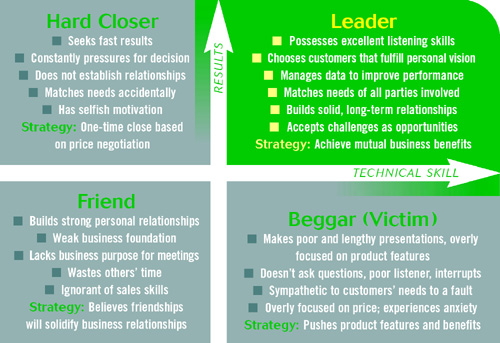If you are growing uncomfortable while reading this and think that you might fit the description of the Beggar, take heart. You truly are under pressure to become a Beggar due to professional purchasing agents who are in the business of negotiating for better prices, more service, and other valuable concessions. When you begin to recognize the ways in which you can avoid those pressures, you begin your ascent out of the role of Beggar.
The key to overcoming archetypal pressure is to recognize when your values fail to match your behaviors. Our values are stated beliefs that often fail to match our actual behaviors. For example, a person will say that they value time, but then waste it reacting irrationally to customer demands. Or a salesperson states that he sells the value of his product or service, but habitually requests price concessions from the employer. Only when you are able to align your behaviors with your values can you begin to emerge as a true sales Leader.
In the Lead The archetypal Leader is a good listener who empathizes with customers’ needs while protecting his own employer’s profitability. The leader reflects a persistent commitment to personal growth and accountability rather than surrendering to industry pressure that jeopardizes profits and credibility. They utilize highly developed questioning skills to achieve an understanding of customers’ goals to determine where (and whether) a fit will occur between a supplier and customer. By comparison, Beggars focus irrationally on the customer’s needs to the detriment of the supplier, Hard Closers concentrate only on the supplier’s needs, and Friends focus only on their own needs and offer little commitment to the growth of their employers or customers. A Leader uniquely ensures that all parties—the customer, supplier, and salesperson—are satisfied.
The most impressive trait that separates Leaders from “accidental salespeople” is an insatiable desire for growth. They recognize that a commitment to personal growth and the development of high-quality sales skills eventually will result in sales success and career security. Leaders build long-term relationships that focus on mutual business benefit, and they develop enough strength and power in their sales roles that they can “choose” their customers. This is a concept that many salespeople find challenging, but is a common ingredient among the most successful people in the industry.
Extensive prospecting efforts and a clear vision of the ideal customer enable the Leader to select clients that will provide long-term security and happiness. Many leaders are also very focused on managing data—e.g. goals, database information, prospect leads, etc.—and all Leaders possess exceptional administrative skills, which makes them valuable resources for customers and employers alike.
After reading this, you may have surmised that a salesperson, in fact, needs to possess elements of all four sales styles to achieve success. Indeed, there are times when a salesperson needs to be tough with a customer (a Hard Closer); there are times when a salesperson needs to establish strong personal rapport (the Friend);and there are times when the best a salesperson can do is bid and pray for positive results (the Beggar). The Leader is the only archetype that recognizes which behavior to adopt for a given situation, and you can strive to become a leader by adopting three very simple behaviors that will affect your entire approach to selling:
In the end, you will discover that merely raising your awareness of alternative behaviors will help you become more powerful in your sales efforts. Think clearly about your behaviors and evaluate your performance daily. At the end of each meeting, ask yourself what you can do to improve. Recognize that you have many behaviors from which you can choose. Exercise smart choices and you will gain the power of a sales Leader.
Rick Davis is president of the Leaders Group, a Chicago-based sales training organization. 773.769.4409. E-mail: rdavis@leaders-group.net.

